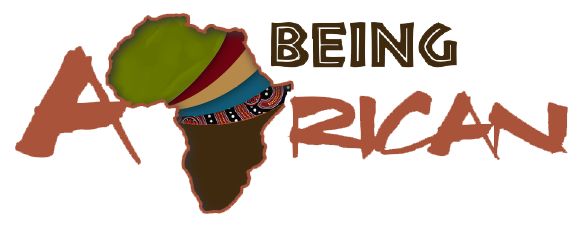Dining & Hosting in Igbo Culture
Igbo dining and hosting
by Toni Akose Ogobegwu
Among the Igbos, cassava and yam are the staple foods. Rice and cocoa yams are also popular food items. Vegetables are an integral part of the Ibo diet. Yams are usually pounded in mortar but sometimes boiled and eaten with palm oil. The pounded yams are simply swallowed, and most people do not chew them. Alternatively, the yams can be roasted and eaten with salted palm oil. The cassava meals can be prepared in two different ways. The first is Apku which is pounded food and is usually eaten with soup. Among the popular soups are bitter leaf soup (ofeonugbu), melon soup (ofe egusi), ukazi soup, and agbonor soup. Gari on the other hand is a snack that can be seasoned with sugar or salt to taste, or both sugar and salt. When an Ibo man has a distinguished visitor, he serves the honorarium food, which varies depending on the area.
Pestle and mortar
In the Igbo language, the pestle is called aka odo (hand of the mortar), and the mortar is called odo. These are essential kitchen utensils in any Igbo household. They are not only used to pound yams and cassava, but they are also used to blend dry ingredients that are used to make different kinds of soup.
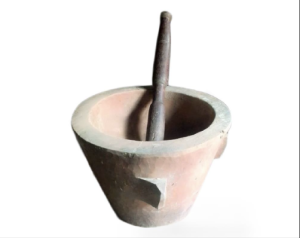
Grinding stone
We now use blenders. In the past, we used grinding stones. Even now, the grinding stones are still used in many Igbo homes. Some people prefer food that is prepared using a grinding stone. According to such people, there is an aroma that the grinding stone adds to the food, which the blending machine does not give.
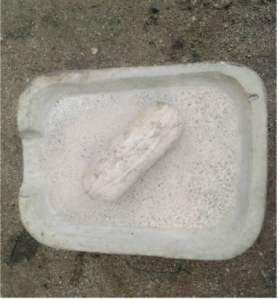
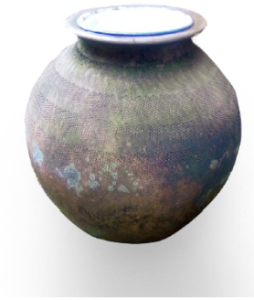
Water supply
In Igboland, before the advent of tap water, streams served as the primary means of water supply. Fetching water for the household from the stream was a chore assigned to children. Clay pots, called Udu, were used to refrigerate the water as there were no refrigerators then. Things have since changed. Today, it is a mission to find these clay pots in use as many families can now afford what, in local parlance, is called pure water packaged in nylon sachets.
In some communities with waterfalls, people go under the waterfall with their water containers and fetch their water. People go to the flowing streams in places without waterfalls, and with their small plates, they fetch water into their basins/pots and carry the basins and pots on their heads. The streams where drinking water is fetched are different from where people go to bathe. Usually, there are different parts of the streams for males and females, and boundaries are strictly adhered to.
In some communities, they believe that there are deities that own the streams, and such beliefs moderate how people conduct themselves in the streams. One such behavior moderation is ensuring that the streams are always kept clean.
Kola nuts (Oji)
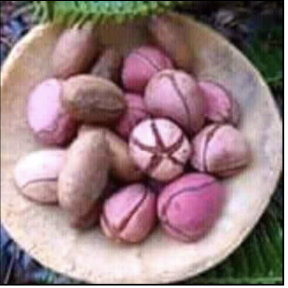
The kola nut is very important in the socio-cultural life of Ndi Igbo. The first food that an Igbo man offers a visitor to his house is kola nut. Every gathering in Igbo land begins with the breaking of the kola nuts. The eldest man in the community is responsible for breaking the kola nut into pieces; after breaking the kola nut into pieces, he takes a bit for himself and gives a portion to the person who brought the kola. Then, a young man in the gathering takes the remaining pieces in a serving tray and passes them to everyone in the group. Age is a significant factor in Igbo land. Therefore, after the eldest man has broken the kola nut and taken his portion, the pieces are passed around according to their respective ages. Usually, the elder who breaks the kola keeps one kola that he does not break. Traditionally, it is believed that the kola, when it gets home, tells of where it came from. Prayers are made with kola nuts. An Igbo adage says that the person who brings kola nut brings life. The Igbo man believes that the kola nuts have ears and serve as a medium for communicating with the gods. The belief holds that the kola does not understand any other language except the Igbo language. So, when the kola is broken, no foreign language is spoken, or the prayer will not accurately be conveyed to the gods. The kola nuts are usually served with alligator pepper.

Kola nuts come in different forms, each with its particular significance. A kola nut with just two pieces is not used for ceremonies in Igboland. It can be served in casual social meetings but never during a traditional gathering. The Igbo man calls this species of kola “Oji awusa.” The kola nut that is used for traditional purposes must have more than two pieces in it. These are served in various ways depending on the occasion.
Photo: calabash cup filled with palm oil
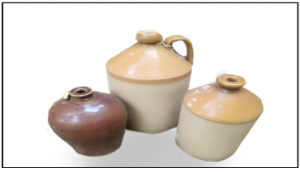
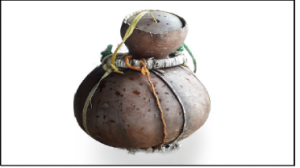
Palm wine (Nkwuelu/MmanyaNkwu)
In Igboland, palm wine is a drink of honor and is usually served when entertaining guests and during festivities. Traditionally, palm wine is stored in a calabash keg or ceramic containers and drunk from calabash cups. However, in recent times, this practice of keeping the wine in calabash kegs and ceramic kegs is being replaced with plastic containers generally known as jerry cans.
Palm wine is called Nku-elu or Mmanya-Nkwu. Like the kola nut, palm wine is deeply rooted in Igbo cultural practices. It is impossible to envisage an Igbo occasion without palm wine. It is never substituted with any other drink. The importance of palm wine can be seen in the name that some Igbo communities call ‘the rite of marriage’: Igba-Nku, carrying palm wine. It is a symbol of marriage in many Igbo communities.
